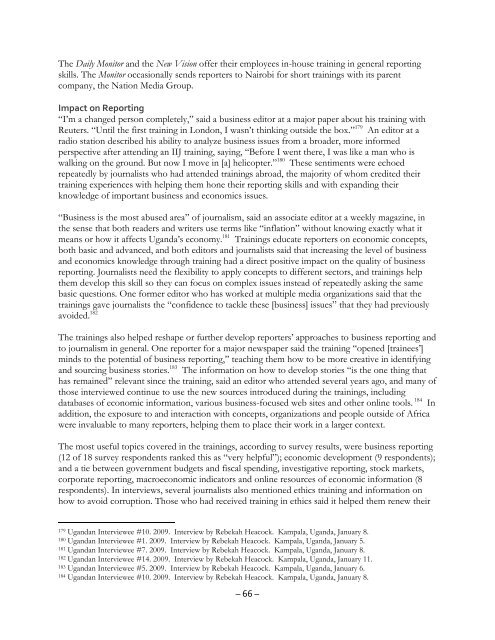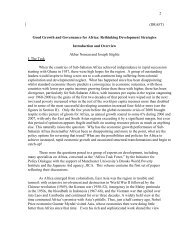THERE WILL BE INK - Initiative for Policy Dialogue
THERE WILL BE INK - Initiative for Policy Dialogue
THERE WILL BE INK - Initiative for Policy Dialogue
Create successful ePaper yourself
Turn your PDF publications into a flip-book with our unique Google optimized e-Paper software.
The Daily Monitor and the New Vision offer their employees in-house training in general reportingskills. The Monitor occasionally sends reporters to Nairobi <strong>for</strong> short trainings with its parentcompany, the Nation Media Group.Impact on Reporting“I’m a changed person completely,” said a business editor at a major paper about his training withReuters. “Until the first training in London, I wasn’t thinking outside the box.” 179 An editor at aradio station described his ability to analyze business issues from a broader, more in<strong>for</strong>medperspective after attending an IIJ training, saying, “Be<strong>for</strong>e I went there, I was like a man who iswalking on the ground. But now I move in [a] helicopter.” 180 These sentiments were echoedrepeatedly by journalists who had attended trainings abroad, the majority of whom credited theirtraining experiences with helping them hone their reporting skills and with expanding theirknowledge of important business and economics issues.“Business is the most abused area” of journalism, said an associate editor at a weekly magazine, inthe sense that both readers and writers use terms like “inflation” without knowing exactly what itmeans or how it affects Uganda’s economy. 181 Trainings educate reporters on economic concepts,both basic and advanced, and both editors and journalists said that increasing the level of businessand economics knowledge through training had a direct positive impact on the quality of businessreporting. Journalists need the flexibility to apply concepts to different sectors, and trainings helpthem develop this skill so they can focus on complex issues instead of repeatedly asking the samebasic questions. One <strong>for</strong>mer editor who has worked at multiple media organizations said that thetrainings gave journalists the “confidence to tackle these [business] issues” that they had previouslyavoided. 182The trainings also helped reshape or further develop reporters’ approaches to business reporting andto journalism in general. One reporter <strong>for</strong> a major newspaper said the training “opened [trainees’]minds to the potential of business reporting,” teaching them how to be more creative in identifyingand sourcing business stories. 183 The in<strong>for</strong>mation on how to develop stories “is the one thing thathas remained” relevant since the training, said an editor who attended several years ago, and many ofthose interviewed continue to use the new sources introduced during the trainings, includingdatabases of economic in<strong>for</strong>mation, various business-focused web sites and other online tools. 184 Inaddition, the exposure to and interaction with concepts, organizations and people outside of Africawere invaluable to many reporters, helping them to place their work in a larger context.The most useful topics covered in the trainings, according to survey results, were business reporting(12 of 18 survey respondents ranked this as “very helpful”); economic development (9 respondents);and a tie between government budgets and fiscal spending, investigative reporting, stock markets,corporate reporting, macroeconomic indicators and online resources of economic in<strong>for</strong>mation (8respondents). In interviews, several journalists also mentioned ethics training and in<strong>for</strong>mation onhow to avoid corruption. Those who had received training in ethics said it helped them renew their179 Ugandan Interviewee #10. 2009. Interview by Rebekah Heacock. Kampala, Uganda, January 8.180 Ugandan Interviewee #1. 2009. Interview by Rebekah Heacock. Kampala, Uganda, January 5.181 Ugandan Interviewee #7. 2009. Interview by Rebekah Heacock. Kampala, Uganda, January 8.182 Ugandan Interviewee #14. 2009. Interview by Rebekah Heacock. Kampala, Uganda, January 11.183 Ugandan Interviewee #5. 2009. Interview by Rebekah Heacock. Kampala, Uganda, January 6.184 Ugandan Interviewee #10. 2009. Interview by Rebekah Heacock. Kampala, Uganda, January 8.– 66 –














